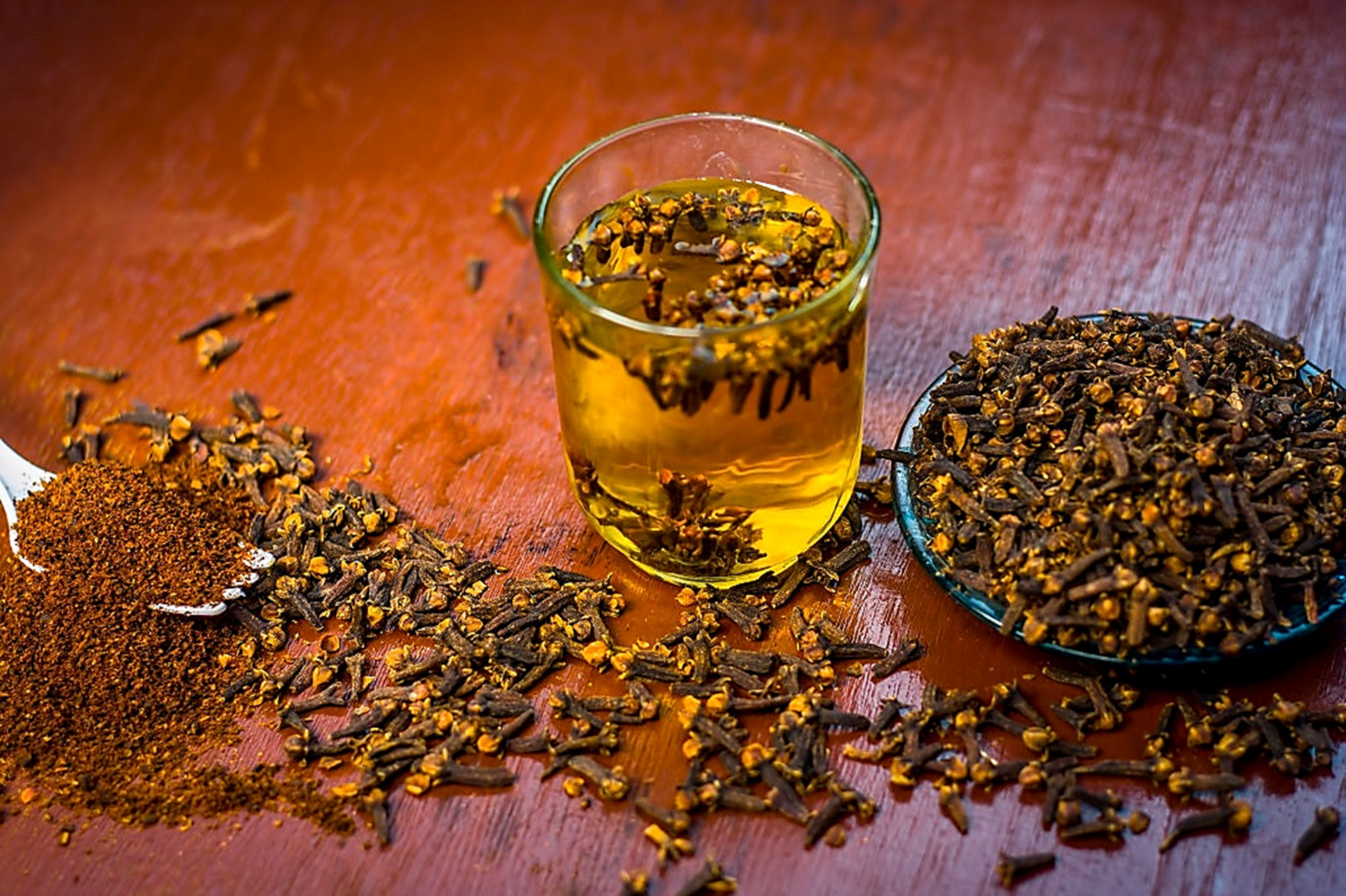What’s All This Hoopla About Clove Water?
Have you been hearing a lot of buzz about clove water? It’s trending, for sure. Turns out, as I’m checking the facts, all the hoopla over it is showing up as true!

Recent research has shown that clove water is excellent for the skin, reducing internal inflammation, fighting bacteria, and more. One of the most significant benefits is that it helps strengthen the immune system.
Studies reveal that clove has potent antiviral compounds that work in two ways. First, they flush out bacteria that cause common colds and flu. Secondly, these compounds help increase white blood cells that protect your body from and fight infection. White blood cells are your body’s natural defense against sickness and disease.
It’s naturally rich in antioxidants and compounds that have been shown to have antibacterial properties. Take eugenol, for example. This compound stops oxidative damage and free radicals. Recent research shows that eugenol is significantly more potent than other antioxidants.

Clove water also has analgesic effects that alleviate everyday aches and pains. It is most commonly used to relieve headaches and migraines. However, it’s also been proven to effectively reduce dental pain, sore muscles, arthritis, and even menstrual cramps. In addition, it is believed to block the transmission of pain signals to the brain, which helps reduce pain sensations at the application site.
And if you grind cloves into a powder, they’ll work as a topical analgesic when applied to muscle aches, joint pain, and minor cuts and scratches.
Its other compounds, carvacrol and thymol, have potent anti-inflammatory effects. They help with inflammation of muscles and joints as well as internal organ inflammation (such as the liver). Clove water also helps mitigate diabetes, autoimmune disorders, and chronic illnesses such as arthritis and asthma.

Studies show clove water can reduce LDL or ‘bad’ cholesterol and triglycerides, both of which are markers of cardiovascular diseases. Cloves have also been known to improve circulation and lower blood pressure.
And in dermatology research, clove water has been shown to be good as a natural facial cleanser. It reduces acne, improves skin tone, moisturizes, and reduces wrinkles.
Science is showing that cloves and clove water really is a powerful age-old remedy that deserves the attention it’s getting. And to top off all its benefits, it is inexpensive and easy to make.
The most common way to make clove water is to steep it like tea. Prepare a cup of hot (not boiling) water. Add one teaspoon whole cloves and let steep for 5-10 minutes. When ready to drink, pour tea through a strainer to remove soaked cloves.

Clove water is considered safe and has no known side effects as a drink or when applied topically. And adding some pure raw honey along with a smidge of cinnamon will give it another flavor level. Whether taken hot or iced, it’s a good addition to your water repertoire. However, as with most natural remedies, its use should be discussed with a healthcare professional before trying.

Recent research has shown that clove water is excellent for the skin, reducing internal inflammation, fighting bacteria, and more. One of the most significant benefits is that it helps strengthen the immune system.
Studies reveal that clove has potent antiviral compounds that work in two ways. First, they flush out bacteria that cause common colds and flu. Secondly, these compounds help increase white blood cells that protect your body from and fight infection. White blood cells are your body’s natural defense against sickness and disease.
It’s naturally rich in antioxidants and compounds that have been shown to have antibacterial properties. Take eugenol, for example. This compound stops oxidative damage and free radicals. Recent research shows that eugenol is significantly more potent than other antioxidants.

Clove water also has analgesic effects that alleviate everyday aches and pains. It is most commonly used to relieve headaches and migraines. However, it’s also been proven to effectively reduce dental pain, sore muscles, arthritis, and even menstrual cramps. In addition, it is believed to block the transmission of pain signals to the brain, which helps reduce pain sensations at the application site.
And if you grind cloves into a powder, they’ll work as a topical analgesic when applied to muscle aches, joint pain, and minor cuts and scratches.
Its other compounds, carvacrol and thymol, have potent anti-inflammatory effects. They help with inflammation of muscles and joints as well as internal organ inflammation (such as the liver). Clove water also helps mitigate diabetes, autoimmune disorders, and chronic illnesses such as arthritis and asthma.

Studies show clove water can reduce LDL or ‘bad’ cholesterol and triglycerides, both of which are markers of cardiovascular diseases. Cloves have also been known to improve circulation and lower blood pressure.
And in dermatology research, clove water has been shown to be good as a natural facial cleanser. It reduces acne, improves skin tone, moisturizes, and reduces wrinkles.
Science is showing that cloves and clove water really is a powerful age-old remedy that deserves the attention it’s getting. And to top off all its benefits, it is inexpensive and easy to make.
The most common way to make clove water is to steep it like tea. Prepare a cup of hot (not boiling) water. Add one teaspoon whole cloves and let steep for 5-10 minutes. When ready to drink, pour tea through a strainer to remove soaked cloves.

Clove water is considered safe and has no known side effects as a drink or when applied topically. And adding some pure raw honey along with a smidge of cinnamon will give it another flavor level. Whether taken hot or iced, it’s a good addition to your water repertoire. However, as with most natural remedies, its use should be discussed with a healthcare professional before trying.
 Alice Osborne
Alice Osborne
DVO Newsletter Contributor since 2006
Email the author! alice@dvo.com
Sources:
- www.anveya.com
- www.emedihealth.com
- www.quora.com
- www.herzindagi.com
